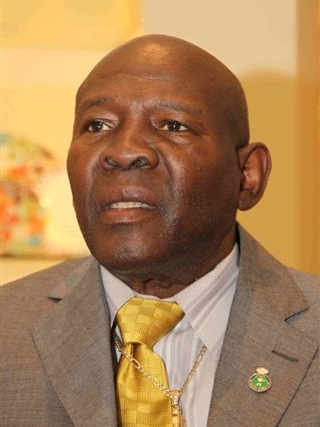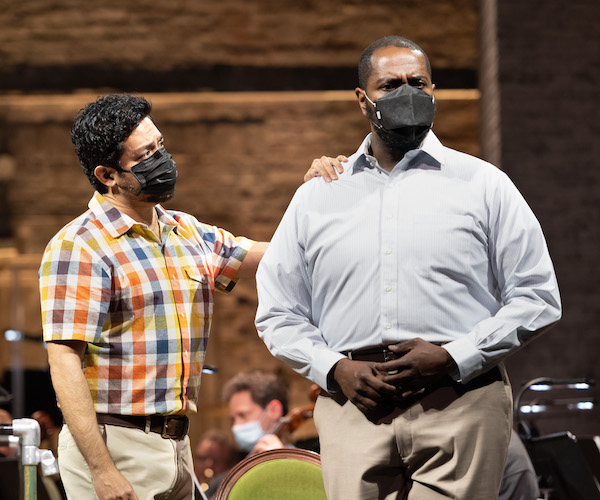Opera Review: “Champion: An Opera in Jazz” — Fought to a Draw
By Con Chapman
The cast for this Boston Lyric Opera production was first-rate, and composer Terence Blanchard has worked in a wide variety of jazz styles and shifts gears to keep the score swinging throughout.
Champion: An Opera in Jazz. Music by Terence Blanchard. Libretto by Michael Cristofer. Staged by the Boston Lyric Opera at the Emerson Cutler Majestic Theatre, Boston (closed).

Boxer Emile Griffith, the subject of the opera Champion. Photo: Wikipedia
The sport of boxing is ancient — Homer mentions four fighters in the Iliad and the Odyssey — and simple by comparison to others; no stick or ball, just two men punching each other. It is also the most male of sports; the first recorded prize fight between women didn’t occur until 1722, at which point men had been duking it out for over three thousand years. Writers from Arnold Bennett to George Orwell have confirmed my observation that the percentage of women at a boxing match is much lower than at other sporting events.
As such, a touch of femininity in a boxer is a novelty. Muhammad Ali taunted his opponents by saying he was prettier than them, but his antics were a put-on. Emile Griffith, by contrast, was the real thing; he worked as a designer of women’s hats, as he revealed in 1961 to a national audience on the television show I’ve Got a Secret. The boxing press declined to follow this and other indications in Griffith’s life — a marriage that lasted only two months, the younger men with whom he went dancing — to draw the conclusion that others might have reached; namely, that he was gay. One suspects that, since acknowledgment of discrimination against homosexuals in popular culture was several years in the future, this was less out of respect for Griffith’s privacy and more a refusal to believe that a man engaged in a violent sport was not exclusively heterosexual.
Griffith is now remembered not for his long and successful career — he held titles in three weight classes — but for a single bout in 1962 when the punches he threw caused the death of Benny “Kid” Paret. The two had fought twice previously, and before the second fight Paret had been advised by his cornermen to throw Griffith off his game by mocking his sexuality. Paret won that fight, regaining the welterweight title he had lost to Griffith seven months before. At the weigh-in for the third fight, Paret stuck to this winning strategy; he mimed the act of anal intercourse behind Griffith as the latter stepped on the scale, and called him “maricón” (literally, “Big Mary”), a Spanish slur for homosexual. In the twelfth round Griffith stunned Paret with a flurry of punches, then — with Paret on the ropes and unable to defend himself — continued to pummel him until he lost consciousness; he died ten days later.
That tragedy is the subject of the opera Champion, with music by jazz trumpeter and composer Terence Blanchard and libretto by Michael Cristofer, performed here by Boston Lyric Opera with Terrence Chin-Loy as Paret and three men as Griffith at different stages of his life: in old age, Brian Major; in his prime, Markel Reed; and as a boy, Jonathan Harris. Blanchard played in the bands of Lionel Hampton and Art Blakey before establishing himself with a group he and saxophonist Donald Harrison co-led in the ’80s, and he has since diversified into film scores, writing the music for forty-two movies, and opera. Champion, written in 2013, was his first, and Fire Shut Up in My Bones, based on the memoir by New York Times columnist Charles Blow, his second. Cristofer is an actor and playwright whose play The Shadow Box won both a Pulitzer Prize and a Tony Award.
Champion is being presented here as “An Opera in Jazz,” an embellishment on its original title. Given that those two musical categories don’t have mass appeal in America, it isn’t surprising that Champion hasn’t been recorded for commercial distribution. At the moment, you’ll have to see it in person to hear it. And you should do so if you have the chance. The cast for the BLO production was first-rate, with Tichina Vaughn as Griffith’s mother; Chabrelle Williams as Cousin Blanche, the woman who raised Griffith when he was separated from his mother; and Jesus Garcia as Luis Rodrigo, a younger man with whom Griffith had a long and stable relationship.
If, like me, you prefer jazz to opera in the European style, the decision by Blanchard and others like him (such as saxophonist Wayne Shorter) to attempt full-length works in the genre is encouraging. The first opera set to African-American music, Scott Joplin’s Treemonisha, was not performed until 1972, 61 years after it was written. Operatic works by other Black composers have similarly languished — Duke Ellington started working on his Queenie Pie in the ’30s, but it wasn’t staged until the ’60s. That said, there is a limit to how much one can “jazz up” opera, whose action is carried forward by recitativo, a style of vocalization in which a singer uses the rhythm of ordinary speech. Jazz, as Ellington famously wrote, don’t mean a thing if it ain’t got that swing, a sense of forward propulsion over a syncopated beat, and the two thus make uncomfortable bedmates. Blanchard has worked in a wide variety of jazz styles, however, and shifts gears to keep the score swinging throughout.

l to r.: Jesus-Garcia as Luis Griffith and Brian Major as Emile Grffith in a dress rehearsal of Boston Lyric Opera’s production of Champion: An Opera in Jazz. Photo: Liza Voll.
Friedrich Hebbel, a 19th century German dramatist, once said that in a good play everyone is right; if only the hero is right, what you get is melodrama. There is not much to recommend Benny Paret to an audience given his crude mockery of Griffith, but he died in a sport where death has not been the measure of victory since ancient Rome. Paret grew up poor in Cuba and didn’t attend school past kindergarten — he was, in the words of one Griffith biographer, “illiterate in two languages.” He was thus easily persuaded by his handlers, who are the real villains of the incident that so infuriated Griffith. None of this backstory is told here, however. In Champion Paret is reduced to a one-dimensional homophobe. The truth is that he was ignorant, not evil. Griffith, on the other hand, was hardly the saint of same-sex love he has been made out to be. He remained closeted for most of his life and, perhaps in a defensive move publicly used gay slurs to distance himself from those with whom he should have shared a common bond. As the opera opens Griffith is shown in old age suffering from pugilistica dementia — he is so punch drunk that he doesn’t know what his shoes are for — and this becomes a leitmotif for his confusion about his sexuality. This much is true to life; to the end, Griffith would reply “I don’t know what I am” when asked whether he was homosexual.
This is, of course, not the first time that a libretto took liberties with its source material; E.M. Forster re-arranged the chronology of Herman Melville’s Billy Budd in his libretto for Benjamin Britten’s opera based on the novella. But Cristofer does more to conceal the conflicts in the boxer’s life than reveal them. Griffith’s failed marriage long preceded the fatal fight with Paret. Cristofer has it come later. He has Griffith undergo an adult conversion to homoerotic attraction out of loneliness; in reality, Griffith had consensual same-sex encounters as an adolescent, and was abused both by an uncle and by another boy in a reformatory, incidents that may have led him to conflate violence and sexual passion. As a result, instead of breaking through the defenses of Griffith’s wounded psyche, the lyrics in Champion don’t lay a glove on him.
Con Chapman’s Kansas City Jazz: A Little Evil Will Do You Good will be published in February, 2023, by Equinox Publishing.
Tagged: Boston-Lyric-Opera, Champion: An Opera in Jazz, Con Chapman, Emile Griffith, Michael Cristofer

This is an impressive dramaturgical essay on the opera, but an actual review of the performance would have been appreciated. This is not a review.
I saw it yesterday – even with the semistaging, it was a powerful production and one of the best productions BLO has offered in the past decade. The cast was uniformly excellent and strong; the music was an interesting mix of jazz, Caribbean (?) beats, and more traditional lyricism. The libretto was well matched to the score and Emile’s aria later in the show (Inside Outside) was the crown jewel musically and dramatically. I’m excited to see what the Met does with it next year, but am also worried that the more delicate sections (eg more Jazzy areas where it’s drums/piano/upright bass) will get lost in the barn of the Met. Having the orchestra on stage yesterday highlighted the non-standard (as far as most operas go) instrumentation.
[…] Boston Opera Review: “Champion: An Opera in Jazz” Fought to a Draw The cast for this Boston Lyric Opera production was first-rate, and composer Terence Blanchard has worked in a wide variety of jazz styles and shifts gears to keep the score swinging throughout. artfuse.org […]